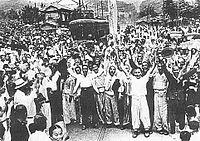- David Kwang-sun Suh
-
David Kwang-sun Suh is a theologian in Korea.[1] He sees the cooperation between the Korean Christians' minjung Korea.[2] Both are included in the independence movement One in March 1919 for the Netherlands against the han invaders.[2] minjung Koreaappeared to resist outside influences and people free themselves from the slavery of Korean Japanese.[2] Korean Christians engaging with Korean minjung country towards liberation.[2] Movement of March based on two events of World War I and the destruction of the kingdom of Korea]due to the death of the king of the Yi Dynasty King Kojong.[2]
Sun Suh think about minjung Theology.[2] minjung theology is found from Korean shamanism is a religion of treating the poor, oppressed, and marginalized.[2] Korean shamanism is a genuine belief that the Korean people combine a variety of beliefs and practices that influenced Buddhism and Taoism.[2] Korean Shamanism ceremony performed to make the relation between man and nature spirits.[2] Shaman rituals performed to treat the sick, reconciling families apart.[2] minjung Spirituality is a spirituality that emerged from their deep feelings of han, the only possibility of expressing their suffering and longing through the "Special Language".[3] minjung with Korean Shamanism Spirituality is a spirituality in the opposite.[3] Shamanism very individualism and conservative.[3] Korean Christian who embraced individualistic Shamanism, old-fashioned, and that is only interested in materialist only.[3]
han Suh understood as a psychological term.[4] Pain suffering and depressed and powerless it is the essence of a biography of Korea]personally.[4] han is a general feeling of the Korean people who are helpless.[4] The statement also is language indicating minjung experience the reality of the Korean nation is the key word that gives way into the feelings and emotions of Koreans, persistence experienced by the creature's will lemah.[4] Han contain aspects of safety that allows people to survive in misery.[4]
References
- ^ Parratt, John (2004). An introduction to Third World theologies. Cambridge University Press. p. 98. ISBN 9780521797399.
- ^ a b c d e f g h i j (English)David Kwang-sun Suh (15 August 2000). The Korean Minjung in Christ. Wipf and Stock. pp. 36–37. ISBN 9781579105099. http://books.google.com/books?id=3U0EAAAACAAJ. Retrieved 4 May 2011.
- ^ a b c d (English)Virginia Fabella; Kwang-sŏn Sŏ (February 1992). Asian Christian spirituality: reclaiming traditions. Orbis Books. p. 33. ISBN 9780883448007. http://books.google.com/books?id=lxPZAAAAMAAJ. Retrieved 4 May 2011.
- ^ a b c d e Andreas Anangguru Yewangoe (1987). Theologia crucis in Asia: Asian Christian views on suffering in the face of overwhelming poverty and multifaceted religiosity in Asia. Rodopi. p. 141. ISBN 9789062036103. http://books.google.com/books?id=VGJ4w6oVqoAC&pg=PA241. Retrieved 4 May 2011.
Categories:- Christian theologians
Wikimedia Foundation. 2010.

